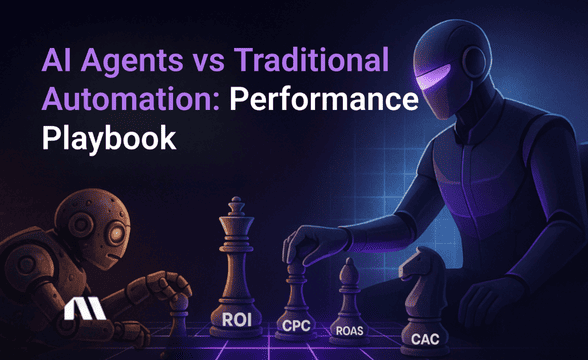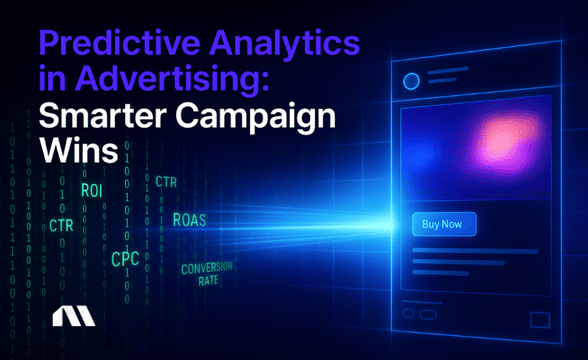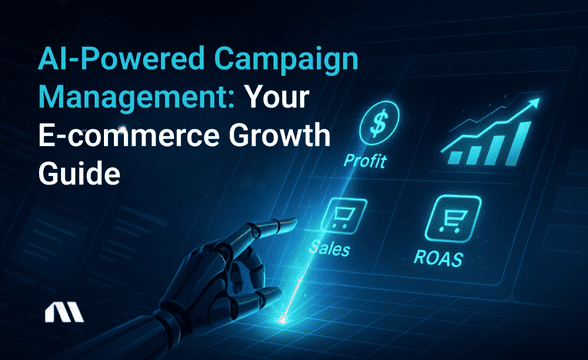Master AI growth marketing with proven tools, implementation strategies, and ROI measurement frameworks. Get the complete guide for performance marketers.
Ever feel like you're playing catch-up in a game where the rules keep changing? You're optimizing campaigns the same way you did two years ago, but your competitors are somehow pulling ahead with advanced precision.
Here's what's really happening: they've implemented strategic AI growth marketing, and you're still fighting with yesterday's weapons.
The numbers don't lie - 69.1% of marketers have already integrated AI tools into their operations, and companies using AI marketing platforms are seeing 20-30% higher campaign ROI compared to traditional methods. But here's the kicker: most performance marketers are either paralyzed by choice or implementing AI tools completely wrong.
This isn't another "AI will change everything" fluff piece. This is your practical roadmap to selecting, implementing, and actually measuring AI tools that move the needle on your growth metrics. No hype, no BS - just the framework that's helping performance marketers scale profitably in 2025.
What You'll Master in This Guide
- AI Tool Selection Framework - Cut through the noise with a proven evaluation matrix that identifies tools worth your investment
- 30-60-90 Day Implementation Timeline - Step-by-step rollout strategy that minimizes risk while maximizing team adoption
- ROI Measurement Methodology - Track actual performance improvements with specific metrics and benchmarks that matter
- Bonus: The five most common AI implementation failures and exactly how to avoid them
What is AI Growth Marketing? (The Strategic Framework)
Let's cut through the buzzword fog. AI growth marketing isn't about replacing your marketing team with robots or letting algorithms run wild with your budget.
It's the strategic use of artificial intelligence tools and platforms to automate repetitive tasks, optimize decision-making in real-time, and scale your growth marketing activities across the entire customer lifecycle.
AI Growth Marketing Definition: The strategic implementation of artificial intelligence tools and platforms to automate, optimize, and scale growth marketing activities across customer acquisition, activation, retention, and revenue expansion through data-driven decision making.
Think of it as giving your marketing operations a brain upgrade. The core components include:
- Data-driven automation that handles routine optimizations while you sleep
- Predictive analytics for smarter audience targeting and budget allocation
- Real-time optimization of ad spend, creative performance, and bidding strategies
- Automated A/B testing that runs continuously without manual intervention
Here's what separates successful AI growth marketing from expensive experimentation: it's not about adopting every shiny new tool. It's about strategically implementing AI where it creates the biggest impact on your specific growth bottlenecks.
Pro Tip: Start with one AI tool category (like AI bid optimization) before expanding to full-stack automation. Master the fundamentals before you scale.
The AI Marketing Tool Landscape: What's Actually Worth Your Investment
The AI marketing space feels like the Wild West right now. There are literally hundreds of platforms claiming they'll revolutionize your growth marketing, and most performance marketers are drowning in options.
Here's how to separate the game-changers from the time-wasters.
Essential AI Tool Categories for Performance Marketers
Campaign Optimization Platforms - These are your heavy hitters for ad performance. Tools like Madgicx automate bid management, budget allocation, and performance monitoring across your Meta advertising campaigns.
Creative Generation & Testing Tools - AI-powered creative platforms that generate ad copy, images, and test variations automatically.
Audience Intelligence Platforms - Advanced targeting tools that use AI to identify high-value prospects and optimize audience segments.
Attribution & Analytics Tools - Platforms that use machine learning to track customer journeys and attribute conversions across multiple touchpoints.
Email & SMS Automation - AI-driven communication platforms that personalize messaging and optimize send times.
According to recent data, the AI marketing market is projected to reach $107 billion by 2028, but that doesn't mean you need to invest in everything. Here's the budget allocation framework that actually works:
- Starter Budget ($1K-5K/month): Focus on one optimization platform plus one creative tool. Master these before expanding.
- Growth Budget ($5K-20K/month): Add audience intelligence and attribution tracking to your stack.
- Scale Budget ($20K+/month): Full-stack AI marketing automation with advanced integrations.
The key insight? Most successful performance marketers start with campaign optimization because it shows the fastest ROI and requires the least operational change.
AI Tool Selection: The Performance Marketer's Evaluation Matrix
Not all AI tools are created equal, and the wrong choice can set you back months. Here's the evaluation framework that separates tools that actually move the needle from expensive experiments.
The IMPACT Framework
Integration ease with your existing tech stack - Can it connect with your current platforms without a complete overhaul?
Measurable ROI within 90 days - Does it provide clear attribution and performance tracking?
Platform reliability and uptime - Will it actually work when you need it most?
Automation depth and customization - Can you set rules that match your specific strategy?
Cost structure and scalability - Does pricing align with your growth trajectory?
Team adoption and learning curve - Will your team actually use it effectively?
Red Flags That Should Make You Run
- Tools requiring extensive technical setup or custom development
- Platforms without clear attribution tracking or performance transparency
- "Black box" algorithms that don't explain their decision-making
- Pricing that scales faster than your potential results
- Tools that promise fully automated solutions without ongoing oversight
Here's a reality check: the best AI tools for performance marketers are often the ones that enhance human decision-making rather than replacing it entirely. Look for platforms that give you more control and visibility, not less.
Pro Tip: Always run a pilot program with any AI tool before committing to annual contracts. Most legitimate platforms offer trial periods or proof-of-concept engagements.
The 30-60-90 Day AI Implementation Timeline
Most AI tool implementations fail because teams try to do everything at once. You end up overwhelming your team, disrupting proven workflows, and abandoning tools before they have time to show results.
Here's the proven rollout strategy that minimizes risk while maximizing adoption.
Days 1-30: Foundation Phase
Week 1: Audit your current marketing stack and identify integration points. Map out your data flow and identify where AI can plug in seamlessly.
Week 2: Set up tracking and establish baseline performance metrics. You can't measure improvement without knowing where you started.
Week 3: Implement your first AI tool with a limited scope. Start with one campaign type or audience segment.
Week 4: Monitor performance closely and gather team feedback. Document what's working and what needs adjustment.
Days 31-60: Optimization Phase
Now you're expanding based on actual results, not assumptions. If your first AI tool is showing positive ROI, gradually increase its scope. If it's not performing, troubleshoot before adding complexity.
Add a second tool category only if your first implementation is successful. Train your team on advanced features and establish regular performance review sessions.
This is where many implementations succeed or fail - resist the urge to rush. AI agents for marketing work best when they're properly configured and monitored.
Days 61-90: Scale Phase
Full deployment of proven AI tools across your campaigns. Integration of multiple platforms for workflow automation. Performance optimization based on 60+ days of data.
Start planning your next quarter's AI tool expansion, but only after you've mastered your current stack.
Pro Tip: Document everything during your implementation. Create playbooks for your team and track what configurations work best for your specific use cases.
ROI Measurement Framework: Proving AI Tool Value
Here's where most AI implementations fall apart - you can't manage what you don't measure, and most marketers are tracking the wrong metrics. This framework shows you exactly how to prove AI tool value to yourself and your stakeholders.
Core Metrics That Actually Matter
Time Savings - Track hours saved per week on manual tasks. This has real dollar value when you calculate team hourly rates.
Performance Lift - Measure percentage improvements in key metrics like CTR, conversion rate, and ROAS.
Cost Efficiency - Track reduction in cost per acquisition, cost per click, or customer acquisition cost.
Revenue Attribution - Direct revenue impact from AI-optimized campaigns compared to control groups.
The ROI Calculation Formula That Works
AI Tool ROI = (Revenue Increase + Cost Savings - Tool Cost) / Tool Cost × 100
Realistic Benchmark Expectations
- Month 1: Break-even or slight negative ROI (learning curve is real)
- Month 2: 50-100% ROI as optimization algorithms learn your data
- Month 3+: 200-300% ROI for well-implemented tools
According to industry data, companies implementing AI marketing tools can see up to 300% ROI when they follow systematic implementation frameworks. The key word here is "systematic" - random tool adoption rarely delivers these results.
Pro Tip: Set up control groups for every AI tool implementation. Run identical campaigns with and without AI optimization to measure true impact.
Common AI Implementation Failures (And How to Avoid Them)
Learn from others' expensive mistakes. These are the top reasons AI marketing tools fail to deliver results, and exactly how to avoid each trap.
Failure #1: Tool Overload Syndrome
Implementing multiple AI tools simultaneously creates confusion, dilutes focus, and makes it impossible to attribute results. Your team gets overwhelmed, and nothing gets properly optimized.
Solution: Start with one tool, master it completely, then expand. Resist the urge to build a complex AI stack from day one.
Failure #2: Poor Data Infrastructure
AI tools need clean, connected data to work effectively. Garbage in, garbage out applies especially to machine learning algorithms.
Solution: Audit your data infrastructure before implementing AI tools. Ensure proper tracking, clean data flows, and reliable attribution.
Failure #3: Unrealistic Expectations
Expecting immediate 10x results leads to premature tool abandonment. AI tools need time to learn your data patterns and optimize performance.
Solution: Set realistic 90-day performance benchmarks and stick to them. Most AI tools show their true value after 60+ days of optimization.
Failure #4: Lack of Human Oversight
Treating AI tools as fully automated solutions without proper monitoring. Even the best AI needs human guidance and strategic direction.
Solution: Maintain regular monitoring and optimization. AI should enhance human decision-making, not replace it entirely.
Failure #5: Wrong Tool for the Job
Choosing AI tools based on marketing hype rather than your specific needs and constraints.
Solution: Use the IMPACT framework above and focus on tools that solve your biggest current bottlenecks.
Advanced AI Growth Marketing Strategies for 2025
Once you've mastered the basics, these advanced strategies separate top performers from the competition. But remember - only implement these after you've proven success with foundational AI tools.
Predictive Audience Modeling
Use AI to identify high-value prospects before they enter your funnel. Predictive targeting for ad audiences can significantly improve your acquisition efficiency by focusing spend on users most likely to convert.
Dynamic Creative Optimization
Automatically test and optimize ad creative based on real-time performance data. This goes beyond simple A/B testing to continuous creative evolution.
Cross-Platform Attribution
Track customer journeys across multiple touchpoints with AI-powered attribution models. This is especially crucial as privacy changes make traditional tracking less reliable.
Automated Budget Allocation
Let AI redistribute ad spend based on performance predictions and real-time data. This can improve overall account performance by 20-40% compared to manual budget management.
The key to advanced AI strategies? They build on solid foundations. Master campaign optimization and measurement before moving to complex multi-platform automation.
Pro Tip: Advanced strategies work best when you have at least 6 months of AI tool experience and clean data from your foundational implementations.
Frequently Asked Questions
How much should I budget for AI marketing tools?
Start with 10-15% of your total marketing budget for AI tools. As you prove ROI and see results, you can increase this to 20-30% for maximum impact. Don't go all-in immediately - scale your investment as you scale your expertise.
Which AI tool should I implement first?
Campaign optimization platforms typically show the fastest ROI with the least operational disruption. Tools like Madgicx can improve Meta advertising performance within 30 days while requiring minimal changes to your existing workflows.
How do I measure if AI tools are actually working?
Track three key metrics: time savings (hours per week), performance lift (percentage improvement in key metrics), and direct revenue attribution. Aim for 200-300% ROI within 90 days, but give tools at least 60 days to show their true potential.
Can AI tools work with my existing marketing stack?
Most modern AI tools offer API integrations with popular platforms like Facebook Ads Manager, Google Analytics, and major e-commerce platforms. Always check integration capabilities during your evaluation process and prioritize tools that connect seamlessly with your current tech stack.
What if my team resists adopting AI tools?
Start small with one tool that solves a clear, painful problem your team faces daily. Show quick wins and time savings before expanding. Involve your team in the selection process to increase buy-in, and provide proper training to reduce anxiety about new technology.
How do I know if an AI tool is worth the investment?
Use the IMPACT framework: Integration ease, Measurable ROI, Platform reliability, Automation depth, Cost structure, and Team adoption. If a tool scores poorly on any of these factors, it's probably not worth your investment.
Your Next Steps to AI-Powered Growth
AI growth marketing isn't about replacing human creativity with algorithms - it's about amplifying your team's impact through intelligent automation and data-driven optimization. The companies seeing up to 300% ROI from AI marketing implementations aren't using magic; they're following systematic frameworks like the one you've just learned.
The reality is that 78% of organizations are already using AI tools in at least one business function, and marketing is leading the charge. The question isn't whether you should adopt AI growth marketing tools - it's whether you'll implement them strategically or get left behind by competitors who do.
Your immediate action plan:
- Audit your current marketing stack and identify the biggest time drains and performance bottlenecks
- Select one AI tool category that addresses your primary pain point using the IMPACT framework
- Set up proper tracking and baseline metrics before implementing any new tools
- Start with a 30-day pilot program to prove value before full deployment
Remember, the goal isn't to automate everything - it's to automate the right things so you can focus on strategy, creativity, and growth. The most successful performance marketers use AI to handle the repetitive optimization work while they focus on the big-picture decisions that drive real business results.
Ready to transform your growth marketing with AI that actually works? Madgicx combines advanced AI optimization with the performance tracking frameworks you need to scale profitably. Our platform handles complex Meta advertising automation while giving you full transparency into what's driving results - no black boxes, no guesswork.
Stop guessing which AI tools will actually improve your performance. Madgicx combines advanced AI optimization with real-time performance tracking, giving you the data-driven insights you need to scale profitably while maintaining full control over your Meta advertising campaigns.
Digital copywriter with a passion for sculpting words that resonate in a digital age.







.avif)







